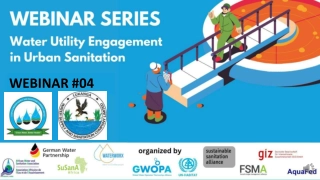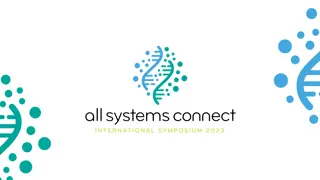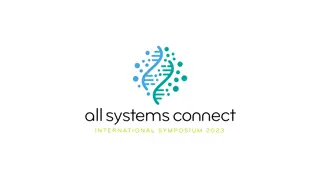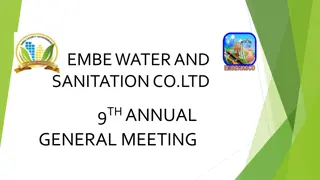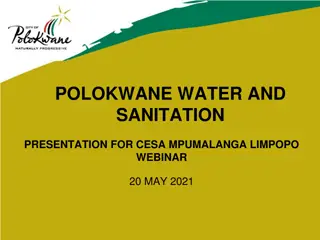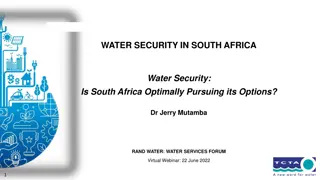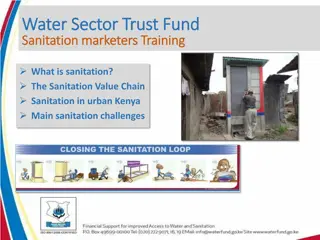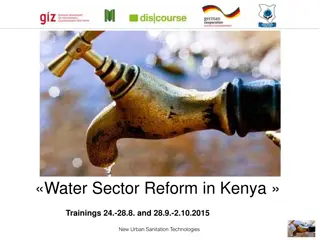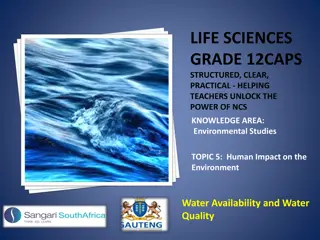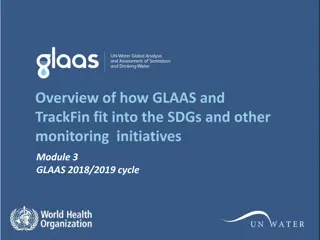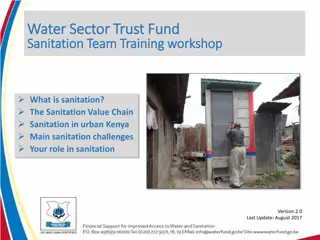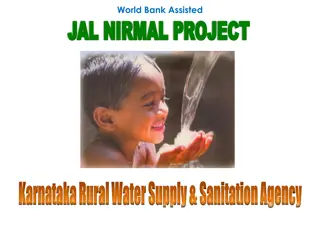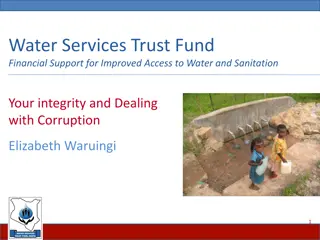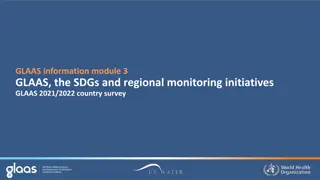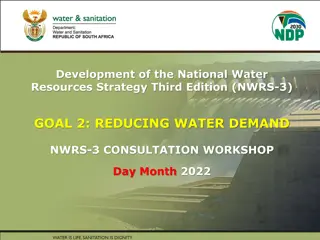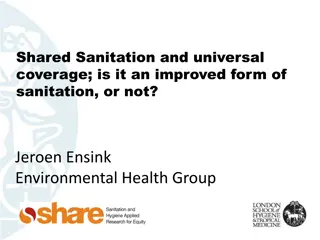Enhancing Water and Sanitation Services Delivery in South Africa
The Minister of Water and Sanitation in South Africa, Senzo Mchunu, is leading efforts to improve water and sanitation services delivery. The focus is on strategic priorities such as infrastructure development, regulatory interventions, combating corruption, and enhancing efficiency in the water sector. The establishment of the National Water Resource Infrastructure Agency aims to address challenges in municipal service delivery and ensure sustainable water supply for the future.
Download Presentation

Please find below an Image/Link to download the presentation.
The content on the website is provided AS IS for your information and personal use only. It may not be sold, licensed, or shared on other websites without obtaining consent from the author. Download presentation by click this link. If you encounter any issues during the download, it is possible that the publisher has removed the file from their server.
E N D
Presentation Transcript
Water and Sanitation Services Delivery Senzo Mchunu Minister of Water and Sanitation 28 September 2022 1
DWS strategic priorities Plan and implement a range of major projects to augment national bulk water resource infrastructure, e.g. Lesotho Highlands Phase 2, uMkhomazi Guide and lead the development of other water resources, including groundwater and desalination Establish the National Water Resource Infrastructure Agency (NWRIA) to own and manage national water resource infrastructure, and to raise finance for its further development Strengthen the role of DWS in regulating, supporting and intervening in municipalities where municipal water and sanitation services are deteriorating, linked to the reinstated blue, green and no drop regulatory monitoring tools Strengthen regulatory interventions to address pollution of the environment and communities from waste-water Increase participation of private sector finance and skills in the water sector Continue to improve water-use license turnaround times and promote transformation in water-use Guide and lead increased water-use efficiency and demand and conservation management, including addressing non- revenue water at municipal level Fight corruption in the water sector at all levels of government Improve billing and revenue collection across the water value chain Establish remaining catchment management agencies Transform Irrigation Boards into Water User Associations Reconfigure and reorient the Water Boards 2
The role of DWS in water and sanitation service delivery Historically, DWS has focused more on the planning, delivery and operation of national water resource infrastructure (such as major dams and associated infrastructure) than on municipal water and sanitation services However, many municipalities are failing to deliver water and sanitation services to national norms and standards and the situation is generally deteriorating DWS is in the process of planning and implementing a range of major projects to augment national bulk water resource infrastructure and is in the process of establishing the National Water Resource Infrastructure Agency (NWRIA) to finance and implement the large-scale investments in national water resource infrastructure that are required to ensure that South Africa has sufficient bulk water supply now and in future. This will ensure that challenges with municipal water and sanitation service delivery are not exacerbated by a shortage of bulk water, as has happened in the cities of Cape Town and Nelson Mandela Bay, amongst others 3
Strengthening national regulation, support and intervention While municipalities are responsible for water services in terms of the Constitution, National Water Act, and Water Services Act, the legislative framework includes checks and balances and requires national government to support municipalities and to intervene where there is non-compliance with minimum norms and standards To date, national government support and intervention related to municipal water and sanitation services has not been sufficiently effective to stop the decline in these services, and national government must take responsibility for this In response, DWS is putting in place a Water Services Improvement Programme to strengthen its support and intervention at municipal level The aim of the programme is to make DWS support and intervention more consistent and systematic as opposed to the current ad-hoc approach 4
Key elements of the Water Services Improvement Programme The programme consists of the following four key elements: 1. In terms of the Water Services Act, DWS will issue updated and more comprehensive and updated norms and standards for water and sanitation services 2. DWS will publish a National Regulatory Dashboard showing the extent of compliance with national norms and standards for water services for all Water Service Authorities, drawing on existing monitoring information, including from the Drop reports, NT, and COGTA reports (no new additional reporting requirements will be put on municipalities) 3. DWS will develop rolling regional support and intervention plans based on the evidence in the Regulatory Dashboard, managed by its regional offices, in consultation with provincial governments, municipalities and DDM structures 4. The support and intervention plans will draw on a range of support programmes which will be developed at national level, and draw on the capacity of the DWS regional offices, the Water Boards, and the private sector The programmme is at an early stage of implementation DWS has also initiated a consultative process to consider options for fundamental reform of the water services sector, for water services to be run by professional utilities, without changing the Constitutional responsibility of municipalities to provide water services 5 5
Establishment of water partnerships office Municipalities are constrained in terms of finance and expertise to address many of the challenges they face In South Africa there is substantial expertise in the private sector and the banks and pension funds are eager to increase the proportion of their portfolios invested in public infrastructure, and specifically water infrastructure Private sector involvement in municipal water and sanitation services is very low in SA compared to other middle- income countries In order to increase private sector involvement, it is necessary to bring properly packaged bankable projects to the market in terms of risk allocation, financing model, clearly defined scope of work and performance measurements, payment model and contractual arrangements DWS has established the National Water Partnerships Office, a ring-fenced entity housed in DBSA Roles of WPO are: o develop standardized national programmes for private sector participation in municipal water and sanitation services, to make it easier, quicker and cheaper for municipalities to enter into partnerships, without having to reinvent the wheel for each partnership o support municipalities to participate in the programmes where municipalities are lacking in the required expertise to undertake feasibility studies and financial structuring o where appropriate, facilitate blended financing, including participation by DFIs 6 6
Standardised partnership programmes No Programme Description 1 Non-revenue water Comprehensive water conservation and water demand management and cost recovery programme focusing on reducing losses, reducing over-consumption and improving cost recovery. Private sector obtains return on investment from savings through reducing losses or from increases in revenue 2 Management contract Programme in which private sector provides overall management support to W&S function in municipality, including both engineering and non-engineering (e.g. revenue collection) aspects. Private sector returns funded from savings through efficiency improvements or from increased revenue A programme focusing on assisting municipalities to upgrade, refurbish and rehabilitate their waste water treatment facilities. Funding and implementation will be done through the PSP Model which leverages a portion of future grant funding Programme focusing on further treatment of municipal wastewater to enable it to be resold for either potable, industrial or agricultural use. Related resource recovery includes energy generation and sludge beneficiation. Private sector obtains return on investment from sale of re-used water, generation of energy and sludge beneficiation Focus on independent water production by producing potable water through seawater desalination in coastal cities. Private sector obtains return on investment from sale of desalinated water to municipalities or other customers (with the approval of the WSA) 3 Wastewater treatment 4 Water re-use 5 Sea water desalination Notes: Other programmes may be developed in future. 7 7
Financial health of the water sector The water sector is facing major financial challenges, caused mainly by weak billing and revenue collection at municipal level, which results in financial challenges throughout the water value chain The provision of water from source to tap is supposed to be a self-sustaining business across the value chain, i.e. the Department, Water Boards, Municipalities and other Water Institutions The Water Trading Entity (WTE) in DWS is currently owed R23 billion and the debt is rising due to non- payment by municipalities which owe the WTE R8,5 billion and R7,6 billion which is owed to the WTE by Water Boards Water Boards are owed approximately R14 billion due to non-payment by municipalities Impact of the rising debt: o Declining credit ratings and borrowing capacity and inadequate investments in infrastructure o Inadequate allocation to operations and maintenance due to weaknesses in revenue collection resulting in a high risk of unreliable services, which will ultimately have a negative impact on water quality and quantity, health, and critically on the environment This challenge needs to be addressed jointly by DWS, NT and COGTA 8
Under-expenditure, implementation delays and corrective measures DWS and many municipalities have a poor record of under-expenditure and delays on their capital projects Corrective measures being implemented by DWS: The Minister is prioritising hands-on monitoring of progress with all the major projects which have been delayed historically, including the Giyani water project, the Vaal sanitation intervention, the Hammanskraal sanitation intervention, the Loskop Dam project, the Umzimvubu and uMkhomazi water projects amongst others The Department is ensuring planning of projects in financial years before they are to be implemented, so they are ready for implementation when the financial year starts The Department has introduced regular reviews of expenditure versus budget for all projects and movement of funds from under-performing projects to fast-moving projects (with the under performing projects to be funded in the following financial year) The Department has developed an Infrastructure Procurement Strategy in line with the NT Framework for Infrastructure Delivery and Procurement Management to enable smarter, quicker and more effective infrastructure procurement and will be implementing the strategy over the coming months Improved project management processes are being implemented in the department We are taking a zero-tolerance approach to fraud and corruption in the procurement and management of projects 9
Thank you 10



